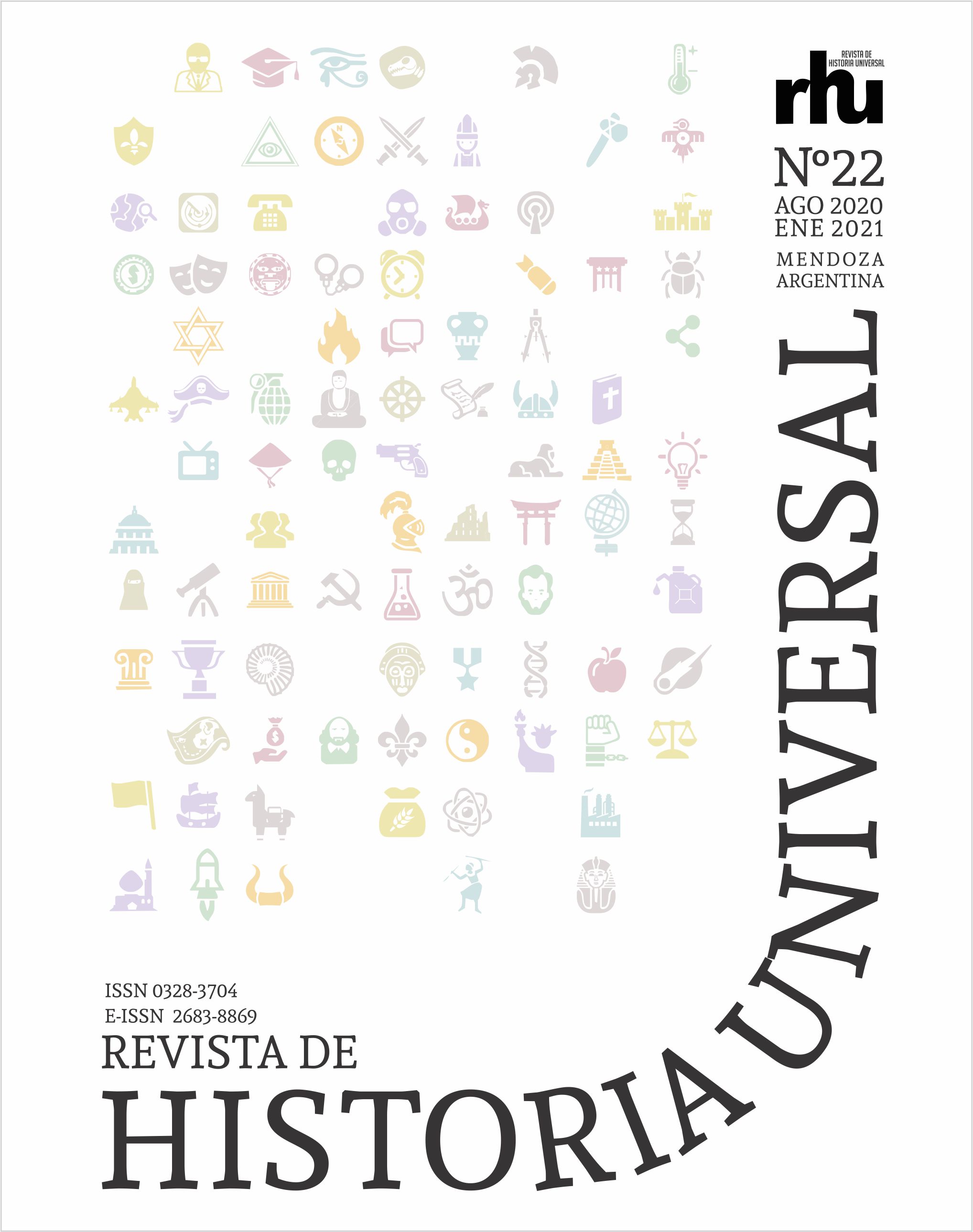La realeza egipcia en tiempos de dominación persa en el relato de Heródoto: un estado de la cuestión.
Keywords:
Egyptian Kingship, Persian Domination, Herodotus, State of ArtAbstract
In Ancient Egypt the King-god occupied a central place in their cosmovision: he maintained the righteous order, Ma´at, and one of his roles was to prevent the entrance of chaos, Isfet, to Egypt. As a dual- King, he embodied the unión of the territory and his power was universal. In this way, the King was linked to the country, so anything that occurred to his person had repercussions in Egypt. Then, what happened if the King lived in foreing land? The purpose of this work is to understand the changes that occurred in the conception of real power during the Late Period (664-332 BC) and offer a state of the matter on Egyptian royalty at the time of the first Persian domination analyzed through the work of Herodotus of Halicarnassus, whose account is the result of a juxtaposition of Greek elements such as Egyptians.
References
Armayor, K. (1980). Sesostris and Herodotus' Autopsy of Thrace, Colchis, Inland Asia Minor and the Levant. Harvard Studies in Classical Philology, (84), 51-74.
Assman, J. (2005). Egipto, Historia de un sentido. Madrid: Abada.
Assman, J. (2011). Cultural memory and early civilization: writing, remembrance, and political imagination. Cambridge: Cambridge University Press.
Bakker, M. (2012). Herodotus’ Proteus: Myth, History, Enquiry, and Storytelling. En: E. Baragwanath & M. Bakker (Eds.) Myth, Truth, and Narrative in Herodotus, (pp. 107-126). Oxford: University Press.
Bernardete, S. (1969). Herodotean Inquiries. La Haya: Martinus Nijhofî.
Campagno, M. (1998). Surgimiento del Estado en Egipto: cambios y continuidades en lo ideológico. Colección Estudios. Nueva Serie; 6. Buenos Aires: Instituto de Historia Antigua Oriental "Dr. Abraham Rosenvasser".
Campos Daroca, J. (1992). Saber y poder en las Historias de Heródoto. Florentia iliberritana: Revista de estudios de antigüedad clásica, 3, 101-116.
Cervelló Autuori, J. (1996). Egipto y África. Origen de la Civilización y Monarquía Faraónicas en su Contexto Africano. Sabadell: AUSA (Aula OrientalisSupplementa, 13).
Chenoll Alfaro, R. (1981). Un aspecto de los logoi egipcios transmitidos por Heródoto. Baetica (4), 115-117.
Cicarma, E. (2014). From the first contacts of Hellenic civilization with Pharaonic Egypt to the Greek Poleis and the Hellenistic Age of Egypt. Scientific Journal of Humanistic Studies; 6 (10), 30-37
Clibborn, E. (1853-1857). On the Identity of the Chronological System of the Egyptian Priests, as Explained by Herodotus, and That of Manetho. Proceedings of the Royal Irish Academy (1836-1869), 6, 347-351. Recuperado desde: http://www.jstor.org/stable/20520490.
Collins, A. (2014). The Divinity of the Pharaoh in Greek sources. The Classical Quarterly, 64(2), 841-844. doi:10.1017/S000983881400007X
Cook, R. M. (1937). Amasis and the Greeks in Egypt. The Journal of Hellenic Studies, 57 (2), 227-237. Recuperado desde: http://www.jstor.org/stable/627147.
Christ, M. (1994). Herodotean Kings and Historical Inquiry. Classical Antiquity, 13(2), 167- 202. Recuperado desde: http://www.jstor.org/stable/25011013.
Del Castillo, A. (1984). Precisiones sobre el sentido de las conquistas de Sesostris-Ramsés en Heródoto y Tácito. Estudios Humanísticos, (4), 9-18.
Drews, R. (1973). The Greek Accounts of Eastern History. Washington: Center for Helleni
Erll, A. (Ed.), Nünning, A. (Ed.) & Young, S. (2008). A Companion to Cultural Memory Studies. Berlin, Boston: De Gruyter.
Espinós, J. (2012). El país de las maravillas: Heródoto en Egipto. En J. L. Arcaz & M. Montero Montero (Eds.) Mare Nostrum. Viajeros griegos y latinos por el Mediterráneo (pp. 199-218). Madrid: Delegación de Madrid de la Sociedad Española de Estudios Clásicos
Fried, L. (2004). The Priest and the Great King: Temple-Palace Relations in the Persian Empire (Biblical and Judaic Studies Vol. 10). Winona Lake: Eisenbrauns.
Harrison, T. (2003). Upside down and back to front: Herodotus and the Greek encounter with Egypt. En R.
Matthews & C. Roemer (Eds.) Ancient Perspectives on Egypt (pp. 145-155). London: UCL Press Herodoto (1992). Historia. Libro I-II. (C. Shrader, Trad.). Madrid: Gredos
Hincks, E. (1849). On the Chronology of the Twenty-Sixth Egyptian Dynasty, and of the Commencement of the Twenty-Seventh. The Transactions of the Royal Irish Academy, 22, 423-436. Recuperado desde:http://www.jstor.org/stable/30079845
Hoffmeier, J. (1981). A New Insight on Pharaoh Apries from Herodotus, Diodorus and Jeremiah 46:17, JSSEA, (11), 165-70.
Kahl, J. (2010). Archaism. En Willeke Wendrich (ed.), UCLA Encyclopedia of Egyptology. Recuperado desde
http://digital2.library.ucla.edu/viewItem.do?ark=21198/zz0025qh2v
Kahn, D. (2003). "Piankhy’s Conquest of Egypt in Greek Sources: Herodotus II 137-140
Revisited". Beiträge zur Sudanforschung (8), 49-58.
Kahn, D. (2014). The War of Sennacherib against Egypt as Described in Herodotus II 141. JAEI, 6 (2), 23-33.
Konstantakos, I. (2018). Time, Thy Pyramids: The Novella of Mycerinus (Herodotus 2.129-134). En Ewen Bowie (Ed.) Herodotus-Narrator, Scientist, Historian (pp. 77-107). Berlin-Boston: De Gruyter.
Ladynin, I. (2012). «The Arrows of Sesostris»: a Topos of Ancient Historiography and the Reality of Ancient Egypt. Journal of ancient history. Recuperado desde https://www.academia.edu/1561630/The_Sesostris_Stelae_A_Topos_of_the_Classical_Historiography_and_the_Ancient_Egyptian_Actualities
López Cruces, J. L. (1992). Reflexiones sobre el Amasis herodoteo (a propósito de Hdt. II 173). Florentia iliberritana: Revista de estudios de antigüedad clásica, (3), 303-316.
Loprieno, A. (2003). Views of the Past in Egypt During the First Millennium b. C. En J. Tait (Ed.) Never Had the Like Occurred: Egypt's View of its Past (pp. 139-154). Londres: University College London.
Lloyd, A. (1988) Herodotus' account of pharaonic history, Historia (37), 22-53.
Lloyd, A. (2002). Egypt. En I.J.F. Bakker, de Jong & H. van Wees (Eds.) Brill's Companion to Herodotus (pp. 415-435). Leiden/Boston/Köln: Brill.
Lloyd, A. (2007). Introduction to Book II. En D. Asheri et. alt. (Eds.) A commentary on Herodotus books I-IV (pp. 223-239). Oxford: Oxford University Press.
Lloyd, A. (ed.) (2010). A Companion to Ancient Egypt. Chichester/Malden, MA: WileyBlackwell
Moyer, I. (2011). Egypt and the Limits of Hellenism. Cambridge: Cambridge University Press.
Moyer, I. (2014). Egyptian History in the Classical Historiographers. En: Wolfram Grajetzki and Willeke Wendrich (eds.), UCLA Encyclopedia of Egyptology. Recuperado desde: http://digital2.library.ucla.edu/viewItem.do?ark=21198/zz002hwc3
Petrie, W. (1908). The Structure of Herodotus, Book II. The Journal of Hellenic Studies, 28(2), 275-276. Doi:10.2307/624611.
Quack, J. (2010). Quelques apports récents des études démotiques à la compréhension du livre II d’Hérodote. Hérodote et l’Égypte. Regards croisés sur le Livre II de l’Enquête d’Hérodote. Actes de la journée d’étude organisée à la Maison de l’Orient et de la Méditerranée. Recuperado de: http://www.persee.fr/doc/mom_0151-7015_2013_act_51_1_2256
Ryholt, K. (2010). 'A Sesostris Story in Demotic Egyptian and Demotic Literary Exercises (O. Leipzig UB 2217)'. En: H Knuf, C Leitz & D von Recklinghausen (Eds.) Honi soit qui mal y pense: Studien zum pharaonischen, griechisch-römischen und spätantiken Ägypten zu Ehren von Heinz-Josef Thissen (pp. 429-437). Leuven:
Peeters, Orientalia Lovaniensia Analecta, 194.
Serrano Delgado, J. M. (2011). Rhampsinitus, Setne Khamwas and the Descent to the Netherworld: Some Remarks on Herodotus II, 122, 1. Janer, (11), 94-108.
Shaw, I. (2007). Historia del Antiguo Egipto. Oxford. (José Miguel Parra Ortiz, Trad.). Madrid: La Esfera de los Libros, S.L.
Spalinger, A. (1978). The Concept of Monarchy During the Saite Epoch- An Essay of Synthesis. Orientalia, (47), 12-36.
Sulek, A. (1989). The Experiment of Psammetichus: Fact, Fiction, and Model to Follow. Journal of the History of Ideas, 50(4), 645-651. Recuperado desde: http://www.jstor.org/stable/2709802.
Thomas, M. (2007). The evergreen story of Psammetichus' inquiry into the origin of language. Historiographia Linguistica, 34, 37-62.
Vannicelli, P. (2001). 'Herodotus' Egypt and the foundations of universal history'. En N. Luraghi N. (Ed.) The Historian’s Craft in the Age of Herodotus (pp. 211-240). Oxford: Oxford University Press.
Vasilescu, M. (2001). Études sur la crédibilité d´Hérodote. I. Les Pharaons Sésostris, Phéron et Protée. Studia Antiqua et Archaeologica, (8), 83-126.
Vittmann, G. (2009). Rupture and Continuity. On Priests and Officials in Egypt during the Persian Period. En P. Briant and M. Chauveau (Eds.) Organisation des pouvoirs et contacts culturels dans les pays de l’empire achéménide (pp. 89-121). Paris: De Boccard.
Wallinga, H. (1959). The Structure of Herodotus II 99-142. Mnemosyne, 12(3), 204-223. Recuperado desde http://www.jstor.org/stable/4428261
West, S. (2007). Rhampsinitos and the Clever Thief (Herodotus 2.121). En J. Marincola(Ed) A Companion to Greek and Roman Historiography, I-II. (Blackwell Companions to the Ancient World) (pp. 322-327). Oxford: Blackwell Publishing.









